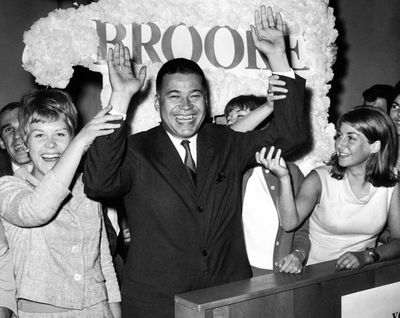Brooke, first elected black U.S. senator, dies
Republican served from Massachusetts

BOSTON – Former U.S. Sen. Edward W. Brooke, a liberal Republican who became the first black in U.S. history to win popular election to the Senate, died Saturday. He was 95.
Brooke died of natural causes at his Coral Gables, Florida, home, said Ralph Neas, Brooke’s former chief counsel. Brooke was surrounded by his family.
Brooke was elected to the Senate in 1966, becoming the first black to sit in that branch from any state since Reconstruction and one of nine blacks who have ever served there – including Barack Obama.
Brooke told the Associated Press he was “thankful to God” that he lived to see Obama’s election. And the president was on hand in October 2009 when Brooke was presented with the Congressional Gold Medal, the highest award Congress has to honor civilians. Obama hailed Brooke as “a man who’s spent his life breaking barriers and bridging divides across this country.”
A Republican in a largely Democratic state, Brooke was one of Massachusetts’ most popular political figures during most of his 12 years in the Senate.
Brooke earned his reputation as a Senate liberal in part by becoming the first Republican senator to publicly urge President Richard Nixon to resign. He helped lead the forces in favor of the Equal Rights Amendment and was a defender of school busing to achieve racial integration, a bitterly divisive issue in Boston.
He also lent his name to the amendment to the 1969 federal housing act that limited to 25 percent the amount of income a family must pay for rent in public housing.
However, late in his second term, Brooke divorced his wife of 31 years, Remigia, in a stormy proceeding that attracted national attention.
Repercussions from the case spurred an investigation into his personal finances by the Senate Ethics Committee and a probe by the state welfare department and ultimately cost him the 1978 election. He was defeated by Democratic Rep. Paul E. Tsongas.
In a Boston Globe interview in 2000, Brooke recalled the pain of losing his bid for a third term.
“It was just a divorce case. It was never about my work in the Senate. There was never a charge that I committed a crime, or even nearly committed a crime,” Brooke said.
In 2008, pioneering newswoman Barbara Walters said she had an affair with the then-married Brooke in the 1970s, but it ended before he lost the 1978 election. She called him “exciting” and “brilliant.”
Brooke received the Presidential Medal of Freedom in a White House ceremony in 2004. Five years later, when Brooke received the congressional honor in Washington, he cited the issues facing Congress – health care, the economy and the wars overseas – and called on lawmakers to put partisan differences aside.
Commenting on Brooke’s election to the Senate and other developments that day in 1966, Martin Luther King Jr. said that “despite appeals to bigotry of an intensity and vulgarity never before witnessed in the North, millions of white voters remained unshaken in their commitment to decency.”
Somewhat aloof from the civil rights movement of the 1960s, especially the militant wing, Brooke said blacks had to win allies, not fight adversaries. But he also said of civil rights leaders: “Thank God we have them. But everyone has to do it in the best way he can.”